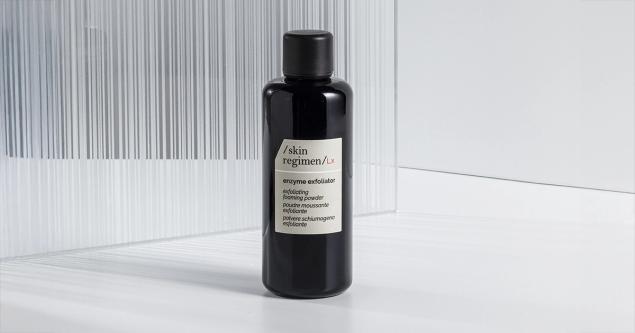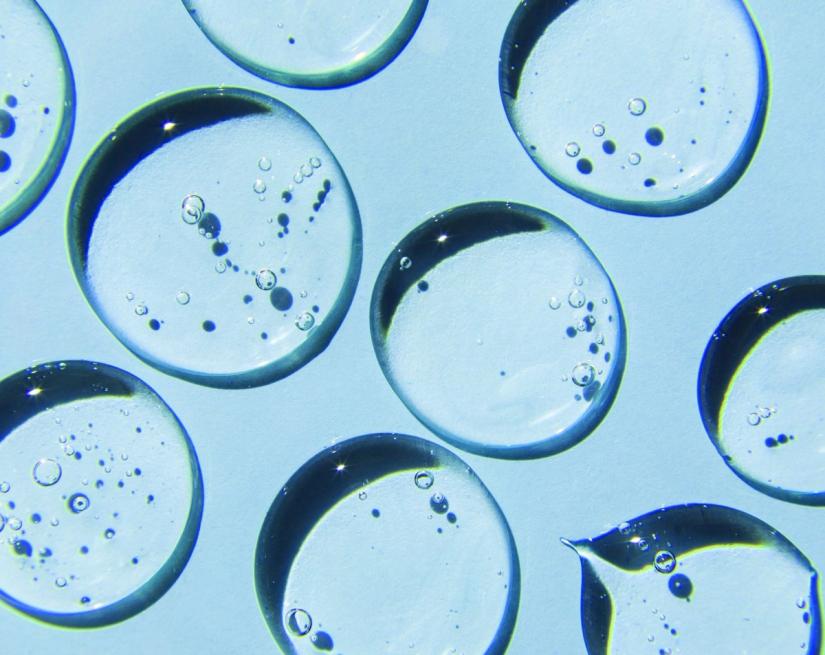skin care
The Power of Enzymes: The Revolutionary Approach to Skincare
Eve Mérinville | Corporate RD Excellence & SC RD and Innovation Director
8 min read

When it comes to skincare, chances are you’ve heard of exfoliation. But have you heard of enzyme skincare? It offers a gentle and effective approach to exfoliation and skin rejuvenation that is ideal for those seeking a more natural and non-invasive alternative to traditional skin care methods.
Enzymes have the ability to break down complex molecules, making them incredibly useful in skincare, as they help to exfoliate dead skin cells, brighten the complexion, and even reduce the appearance of fine lines and wrinkles. Skincare enzymes are often derived from fruits like pineapple or papaya which are known for being gentle on sensitive skin.
Incorporating enzymatic products into your skincare routine can help you achieve smoother, brighter, and healthier-looking skin without causing irritation or damage to the skin's natural barrier. In this article, we are going to further explore how enzymes work, which ones are best for your skin type, how they’re used to amp up your skincare routine, and the impressive skin benefits they offer.
"When considering an exfoliation to boost radiance, it's good to remember that our skin is under constant stress from our environment and stress itself. It may be inflamed without noticeable symptoms, so a great and safe option is an enzymatic cream to gently smooth and hydrate at the same time."
Christine Lee - Comfort Zone Master Educator
How Enzymes Work
Enzymes are protein molecules that act as catalysts in biochemical reactions. This means they speed up the rate of chemical reactions in our bodies without being used up or changed themselves. In the same way naturally occurring digestive enzymes work to break down food, the enzymes used in skincare break down and remove dead skin cells. This allows them to penetrate deeper into the skin to nourish and improve its health. Once these dead skin cells are removed, you are left with brighter, smoother skin, free of blackheads, blemishes, and breakouts.
While enzymes are considered a type of exfoliation, they may be different from the traditional exfoliation you are thinking of. While both enzymatic and traditional exfoliation are designed to remove dead skin cells, they do however differ in their approach. Traditional exfoliation typically contains hydroxy acids like BHAs or AHAs to create a peeling effect, while enzymatic exfoliation is a more natural exfoliator with no need for any rubbing or scrubbing. Enzymatic exfoliation is considered to be gentler than traditional exfoliation, as it does not interfere with the skin’s natural pH balance or cause significant irritation.
Enzymes for Different Skin Types
There are many different skincare products that use a variety of enzymes that are designed to be effective for different skin types. Some enzymes are effective at breaking down excess oils, making them ideal for oily and acne-prone skin, while others are more gentle and suitable for sensitive skin. Enzymes are versatile skincare ingredients because different enzymes work on different skin types and conditions.
Enzymes for Oily and Acne-Prone Skin
Enzymes clear enlarged pores to allow for an improved flow of natural oils, resulting in clearer, better skin. Enzymes also help maintain moisture levels in the skin, blocking out irritants and bacteria, and eliminating the over-secretion of oils. Papain, derived from papaya, is an enzyme that breaks down excess oil and unclogs pores, making it a popular ingredient for products designed for oily and acne-prone skin.
Enzymes for Dry Skin
Those with dry skin should opt for using enzymes that are more hydrating and gentle. Certain enzymes like bromelain, derived from pineapple, help maintain moisture levels while breaking down dead skin cells, resulting in smoother, softer skin.
Enzymes for Sensitive Skin
AHAs and BHAs can often be harsh on sensitive skin. If this is the case, switching to an enzyme-based product will help. Enzymes work to break down dead skin cells without causing any cell turnover as acids do. Enzyme products containing fruit enzymes are gentler on the skin since they are naturally derived and will not cause irritation or redness.
Enzymes for Mature Skin
For mature skin, enzymes that help promote collagen production can be beneficial. Papaya fruit enzymes work to increase the elasticity of the skin, reducing the appearance of fine lines and wrinkles. Other enzymes, like bromelain or pumpkin, are used to brighten dull skin.
Types of Enzymes Used in Skincare
In skin care, enzymes are used to exfoliate and brighten the skin by breaking down dead skin cells and promoting cell turnover. Below, we are diving into several types of enzymes used specifically in skincare products— each providing unique benefits for the skin.
Proteolytic Enzymes
Proteolytic enzymes gently break down keratin protein on the skin’s surface. When the keratin is broken down, the dead skin cells are also broken down and can be easily removed without skin irritation. Proteolytic enzymes are known to be gentle, and effective, and are often derived from fruits like papaya or pineapple. These fruits contain papain and bromelain enzymes which help remove dead skin. When used in skincare, these enzymes help improve skin texture, unclog pores, and prevent potential breakouts by removing excess oil from the skin.
Lipolytic Enzymes
Lipolytic enzymes break down lipids, such as triglycerides, that are fats found in sebum. If sebum is overproduced, the skin can appear too shiny or oily, leading to breakouts. Lipolytic enzymes used in skin care products can help remove excess oil and unclog pores, leaving the skin healthy and refreshed.
Glycolytic Enzymes
Glycolytic enzymes are situated outside of the mitochondria and assist with metabolism.
Oxidative Enzymes
The most common oxidative enzymes used in skincare are peroxidases and oxidases. These enzymes are used to preserve the ingredients used in skin care products and prevent bacterial growth.
Hydrolases
Hydrolase enzymes work to break down nutrients for digestion by means of water. Lipase is a hydrolases enzyme that is most frequently used in cosmetic products. This enzyme helps with deep cleansing, acne, and reduces the appearance of cellulite.

The Benefits of Enzymatic Skincare
Enzymatic skin care involves using products that contain enzymes to help improve the overall health and appearance of the skin. Enzymes work to break down and dissolve dead skin cells, excess oil, and other impurities on the skin's surface. With the use of enzymatic skincare products, there are numerous benefits that allow you to achieve brighter, smoother, and more even-toned skin.
Gentle Exfoliation
While traditional exfoliation often involves a scrub using chemicals, enzymatic products provide gentle and effective exfoliation without causing irritation to the skin. This is because many enzymes come naturally from fruits and vegetables rather than harsh chemicals.
Improved Skin Texture
Enzymes break down the keratin protein in the outer layer of the skin, which bonds dead skin cells together. Without this, the dead skin can gently be removed, promoting healthy cell turnover and resulting in smoother, more radiant skin.
Reduced Inflammation
Some enzymes contain anti-inflammatory properties that help soothe irritated skin. Due to its ability to penetrate deep into the skin, enzymes can reduce inflammation by unclogging pores and also breaking down dead skin cells and excess oil.
Enhanced Product Absorption
By breaking down the outer layer of dead skin cells, enzymes allow other active ingredients, like retinol, vitamin C, and hyaluronic acid, to more effectively absorb into the skin. As a result, you then maximize the benefits of all of your skincare products.
Suitable for All Skin Types
Regardless of any skin concerns you may have, enzymes are considered ideal for all skin types, especially dry or sensitive skin. Whether you are combatting blemishes, breakouts, dull skin, or pigmentation, the consistent use of enzymatic products in your skincare routine will make a difference.
Enzymes in Professional Skincare Treatments
While there are a number of skincare products on the market for use at home, enzymes are becoming increasingly popular in professional skincare treatments as well. They offer a gentle and effective way to exfoliate the skin and improve its overall appearance through the use of peels, facials, microdermabrasion, and masks. It is important to note these are recommended for periodic use rather than as part of your everyday skincare routine.
Chemical Peels
Enzyme peels are often made from fruit enzymes that are gentle on sensitive skin and digest dead skin cells while revealing skin that is immediately brighter and healthier. While chemical peels also achieve these results, they do require a few hours or even days of recovery time and may cause irritation for those with sensitive skin.
Facials
An enzyme facial is usually performed by a professional who applies an enzyme solution to the face for a certain amount of time. These facials can address a variety of skin concerns, such as dullness, hyperpigmentation, uneven texture, or acne.
Microdermabrasion
Microdermabrasion is a non-invasive treatment used to exfoliate the skin with a specialized tool. When paired with natural enzymes and other BHAs, this procedure works to remove dead skin cells, revealing softer, brighter skin in minutes. Microdermabrasion is ideal for improving uneven skin texture, reducing the size of pores, and decreasing dark spots. This treatment is usually performed by a professional.
Masks
Similar to chemical peels, enzyme masks work to slough off dead skin cells to reveal smoother, glowing skin. These masks are made up of natural chemicals that provide gentle exfoliation that is ideal for all skin types. Enzyme masks help fight signs of aging by stimulating cell turnover, promoting collagen production, and unclogging pores. Enzyme masks can be bought over the counter or performed by a skincare provider.
Unleash the Power of Enzymes
Enzymes are a popular buzzword in the skincare world—and for good reason. Many skincare enzymes are derived naturally from fruits like papaya or pineapple, and offer gentle exfoliation on the skin, making them ideal for all skin types. Whether you are incorporating skincare enzymes at home or getting a professional enzymatic treatment, your skin is sure to reap the benefits that come from enzymes. For whatever your skincare needs, Comfort Zone has a variety of high-quality, sustainable products.



